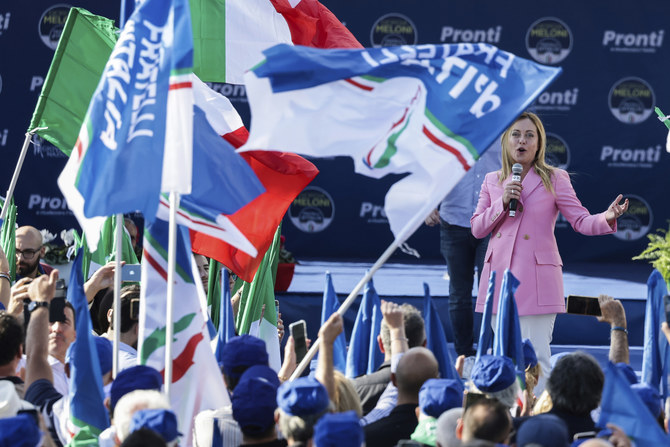ROME: Italians vote Sunday in an election expected to usher in the country’s first government led by the far-right since World War II, bringing euroskeptic populists to the heart of Europe.
The Brothers of Italy party, led by one-time Mussolini supporter Giorgia Meloni, is leading polls and looks set to take office in a coalition with the far-right League and Silvio Berlusconi’s Forza Italia parties.
Meloni, 45, who has campaigned on a motto of “God, country and family,” is hoping to become Italy’s first female prime minister.
Polls open at 0500 GMT and close at 2100 GMT. Many voters are expected to pick Meloni, “the novelty, the only leader the Italians have not yet tried,” Wolfango Piccoli of the Teneo consultancy told AFP.
Brussels and the markets are watching closely, amid concern that Italy — a founding member of the European Union — may be the latest member to veer hard right less than two weeks after the far-right outperformed in elections in Sweden.
If she wins, Meloni will face challenges from rampant inflation to an energy crisis as winter approaches, linked to the conflict in Ukraine.
The Italian economy, the third largest in the eurozone, rebounded after the pandemic but is saddled with a whopping debt worth 150 percent of gross domestic product (GDP).
Meloni has dedicated her campaign to trying to prove she is ready despite her party never before being in power.
Brothers of Italy, which has roots in the post-fascist movement founded by supporters of dictator Benito Mussolini, pocketed just four percent of the vote during the last elections in 2018.
Meloni has moderated her views over the years, notably abandoning her calls for Italy to leave the EU’s single currency.
However, she insists her country must stand up for its national interests, backing Hungary in its rule of law battles with Brussels.
Her coalition wants to renegotiate the EU’s post-pandemic recovery fund, arguing that the almost 200 billion euros Italy is set to receive should take into account the energy crisis aggravated by the Ukraine war.
But “Italy cannot afford to be deprived of these sums,” political sociologist Marc Lazar told AFP, which means Meloni actually has “very limited room for maneuver.”
The funds are tied to a series of reforms only just begun by outgoing Prime Minister Mario Draghi, who called snap elections in July after his national unity coalition collapsed.
Despite her euroskepticism, Meloni strongly supports the EU’s sanctions against Russia over Ukraine, although her allies are another matter.
Berlusconi, the billionaire former premier who has long been friends with Vladimir Putin, faced an outcry this week after suggesting the Russian president was “pushed” into war by his entourage.
A straight-speaking Roman raised by a single mum in a working-class neighborhood, Meloni rails against what she calls “LGBT lobbies,” “woke ideology” and “the violence of Islam.”
She has vowed to stop the tens of thousands of migrants who arrive on Italy’s shores each year, a position she shares with Salvini, who is currently on trial for blocking charity rescue ships when he was interior minister in 2019.
The center-left Democratic Party, led by former prime minister Enrico Letta, says Meloni is a danger to democracy.
It also claims her government would pose a serious risk to hard-won rights such as abortion and will ignore global warming, despite Italy being on the front line of the climate emergency.
On the economy, Meloni’s coalition pledges to cut taxes while increasing social spending, regardless of the cost. Unsurprisingly, perhaps, they want the EU’s rules on public spending amended.
The last opinion polls two weeks before election day suggested one in four voters were backing Meloni.
However, around 20 percent of voters remain undecided, and there are signs she may end up with a smaller majority in parliament than expected.
In particular, support appears to be growing for the populist Five Star Movement in the poor south.
The next government is unlikely to take office before the second half of October, and despite pledges from Meloni and Salvini to serve five years, history suggests they may struggle.
Italian politics are notoriously unstable. The country has had 67 governments since 1946.














